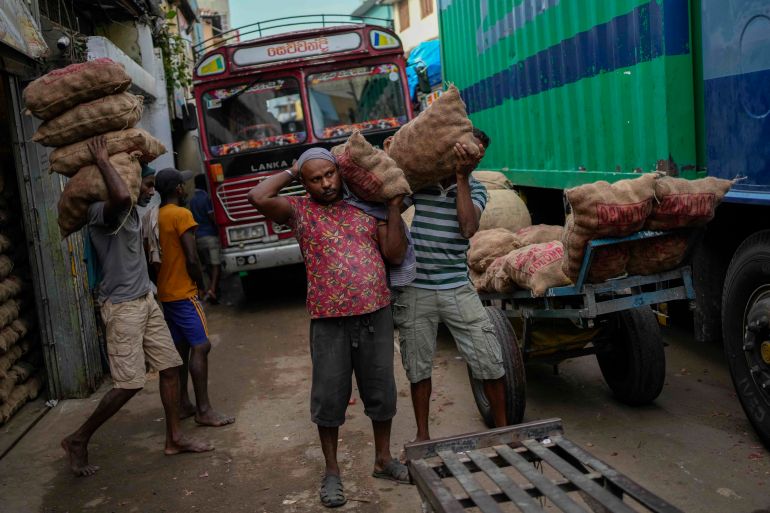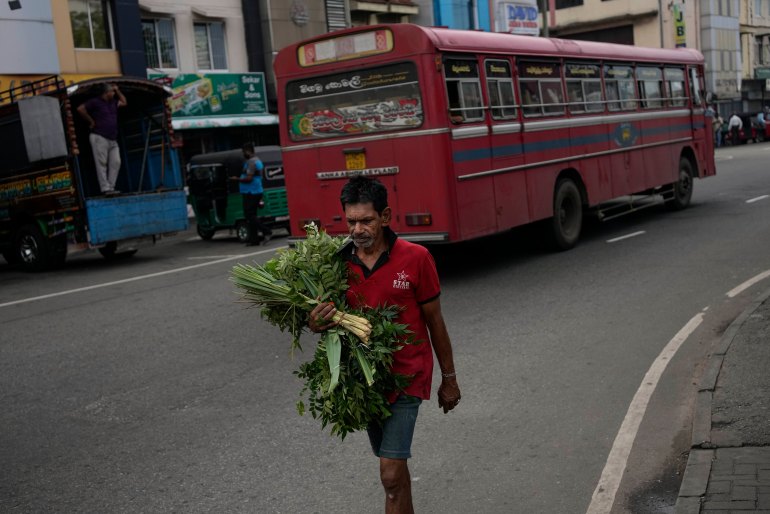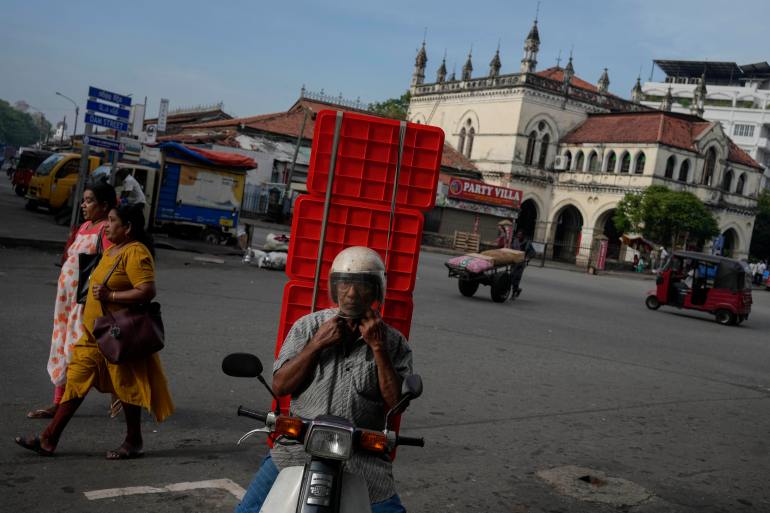Sri Lanka to get first tranche of $2.9bn bailout in two days: IMF
Global lender says the island nation battling its worst economic crisis in seven decades will get $330m in the next two days.

Sri Lanka will get the first $330m tranche of an International Monetary Fund (IMF) bailout package in the next two days, says the global lender, putting the onus on the cash-strapped country to rein in its debt to sustainable levels.
Economic mismanagement, coupled with the effects of the COVID-19 pandemic, left Sri Lanka severely short of dollars for essential imports at the beginning of last year, tipping the island nation into its worst financial crisis in seven decades.
Keep reading
list of 4 itemsSri Lanka’s economy shrank by record 7.8 percent last year
Sri Lanka unions stage strike to protest against IMF bailout plan
Half of Sri Lanka families reducing children food intake: Charity
The IMF’s executive board on Monday approved nearly $3bn, with the endorsement expected to catalyse additional external support to the tune of $3.75bn from the likes of the World Bank, the Asian Development Bank and other lenders.
This was the 17th IMF bailout for Sri Lanka and the third since its decades-long civil war ended in 2009.

The office of President Ranil Wickremesinghe said the programme would enable it to access up to $7bn in overall funding.
“Sri Lanka is no longer deemed bankrupt by the world,” Wickremesinghe said in a video statement.
“The loan facility serves as an assurance from the international community that Sri Lanka has the capacity to restructure its debt and resume normal transactions.”
Al Jazeera’s Minelle Fernandez, reporting from Colombo, said the president wants the first tranche of IMF money to be used in the neediest areas, such as medicine and tourism.
“He has talked about medicine. He has talked about the tourism sector, that these funds would be used to shore up those sectors that are really facing the brunt of the economic crisis,” she said.
Getting financial assurance from China, its largest bilateral creditor, was the last remaining hurdle for Sri Lanka in securing the IMF bailout. Once China confirmed its backing this month, the IMF went ahead with the deal.
Sri Lanka, which also needed support from other big lenders like India and Japan, thanked the international community, including the United States, for talking to the Chinese government to back its debt restructuring plan.
No immediate relief
The IMF funding will, however, not immediately help millions of Sri Lankans, who are being squeezed by soaring costs of living, high income taxes of up to 36 percent and a 66 percent increase in power tariffs.
Half of Sri Lanka’s families have been forced to reduce portions they feed their children, according to a survey by Save the Children released this month.
Citizens waking up on Tuesday to news of the IMF approval said they hoped the funds would reduce some of their burden.
“It must be spent to solve the country’s problems,” said vegetable seller Amilanath Jayatilake, 35, in Colombo. “If they reduce the price of fuel and food items and give people some relief, then it’s good.”

Shehan Semasinghe, state minister of finance, said the IMF bailout was “absolutely essential”.
“But now we have to patiently focus on very difficult reforms going ahead,” he said in a statement late on Monday.
Peter Breuer, senior IMF mission chief for Sri Lanka, Asia and Pacific Department, said debt sustainability was one of the key criteria for the IMF to approve a bailout for any economy.
He said the Sri Lankan government had agreed to enact tougher anti-corruption laws within months during the bailout negotiations.
“We emphasise the importance of anti-corruption and governance reforms as a central pillar of the programme,” he told reporters. “They are indispensable to ensure the hard-won gains from the reforms benefit the Sri Lankan people.”
When Al Jazeera asked Nishan De Mel, economist and director of Colombo-based Verite Research, on the changes expected in Sri Lanka after the IMF bailout, he said there could be a reduction in shortages of the essential items in the short term.
“The public has faced not only escalation in cost, but non-availability of basic items. And that is the main thing that can be alleviated at the moment,” he said.
However, he added that the plan agreed with the IMF increases costs to the public. “I would say somewhat irrationally and unproductively sometimes.”